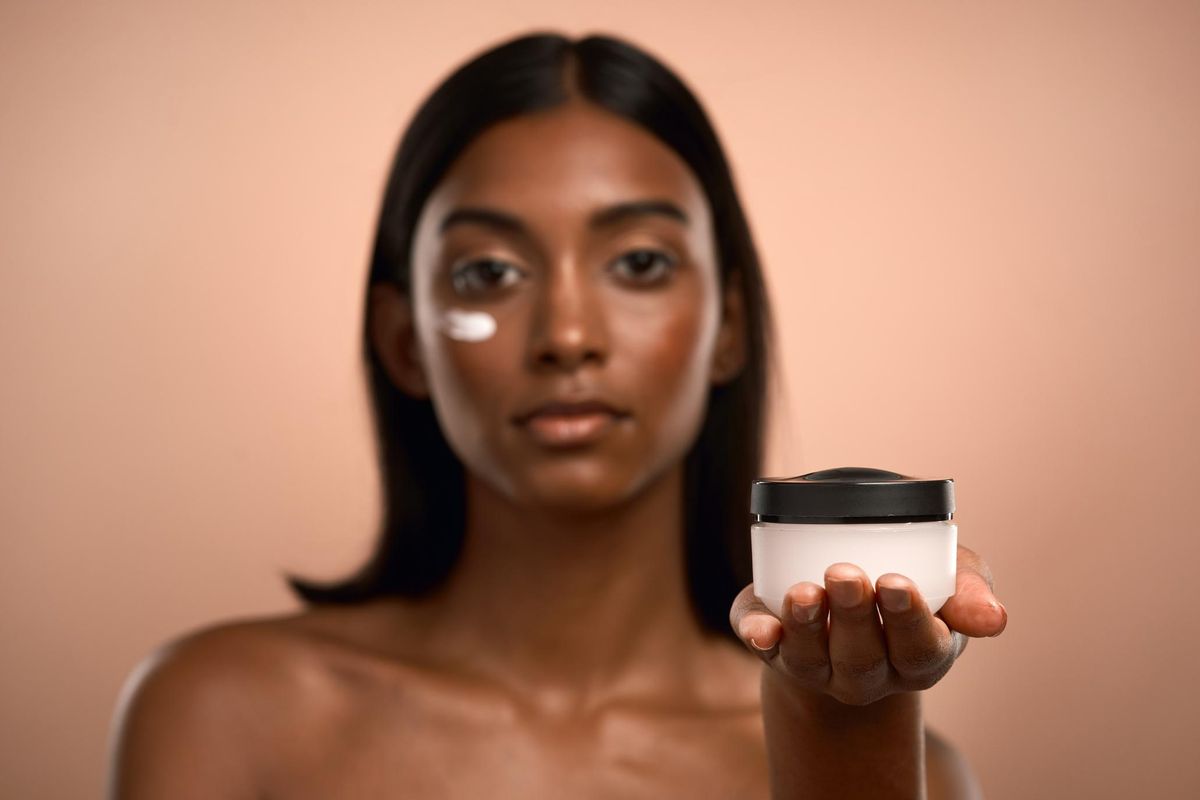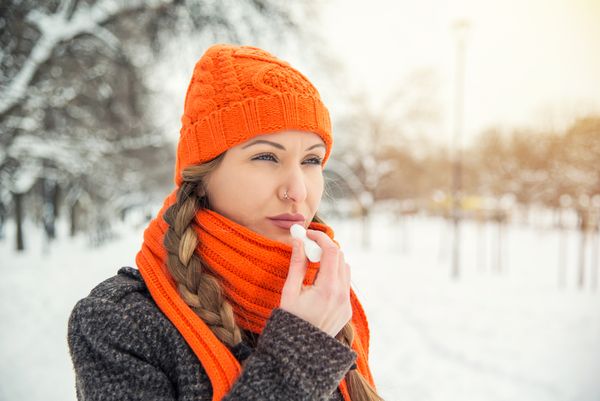“Don’t play outside. You’ll get too dark.”
“No one will marry you if you have dark skin.”
“Men only want fair-skinned women.”
These are words that my cousins and I would hear as our mothers slathered us in creams that promised to lighten our skin. These are words that women of color around the globe hear from loved ones and advertisers.
When I visit family in India, it’s impossible to avoid the billboards showing some version of the following: On one side, a dark-skinned woman is sad and alone, and on the other side, she’s armed with skin lightening cream that has worked its magic. She’s dressed in a business suit and embracing her paramour. The message is clear — she’s found success in both her professional and personal life, thanks to lighter skin.
In 2020, the global market for skin bleaching products was estimated at $8.6 billion and is estimated to reach $12.3 billion by 2027, fueled by the deeply rooted and pervasive message that lighter skin is key for accessing emotional and economic opportunities. And those numbers don’t include black market or misused products. Women around the globe are risking their health using skin whitening products that often include dangerous ingredients like steroids, mercury and hydroquinone, which can have terrible side effects particularly when used for prolonged periods.

A March 2021 review published in the International Journal of Women's Dermatology compiled shocking statistics showing the prevalence of skin whitening globally:
- Up to 75% of Nigerians are estimated to regularly use skin whitening creams.
- An estimated 40% of South Koreans routinely use skin whitening products.
- On the Indian subcontinent, 50% of all spending in the skincare industry is for skin whitening products.
- A recent study estimated that one in two Filipino women use skin whitening products.
The United States alone accounts for about 27% of the skin whitening market, as skin bleaching products are used by brown and Black communities here as well. While the advertisements for these products in the United States might not be as explicit, the standard of beauty certainly still favors lighter skin. This preference for lighter skin tones is a form of discrimination known as colorism.
“It's something that affects people of color in pretty much every region of the world,” said CNN International health editor Meera Senthilingam. “People of color are using these products and aren’t necessarily aware of the physical and mental health harms they are causing. And white people often don't know that it's an issue in the first place — or that such products even exist.”

Meera Senthilingam (Photo/CNN)
As part of CNN’s gender equality initiative “As Equals,” Senthilingam is producing a series called “White Lies: Exposing the Dangers of Skin Whitening” and bringing awareness to this multibillion-dollar industry as well as the health risks associated with it, the underlying issue of colorism that’s driving it, and what’s being done to stop it. For Senthilingam, who is Sri Lankan and grew up in the United Kingdom, the issue is also personal and one she was very well aware of growing up.
The opening episode for the “White Lies” series tells the story of women across India, who for decades have been using steroid creams to lighten their skin. These creams are meant to be prescribed by a doctor and used for a short amount of time to address concerns like eczema, but many women are using them for years or even decades. We meet Soma Banik, a 33-year-old Indian government employee who runs a skincare blog warning others about the dangers of using steroids to whiten skin. She writes from experience; long-term use of the products as a teenager caused itching and acne on her face that lasted for years and triggered permanent facial hair growth — all symptoms of Topical Steroid Damaged/Dependent Face (TSDF).
“Patients who use strong steroids on their skin to lighten or to treat rashes can get recalcitrant steroid acne or perioral [around the mouth and nostrils] dermatitis. This is like an addiction to the steroids, as their skin will become red, itchy and bumpy when the steroids are stopped, so they reach again for the steroid,” said Dr. Elizabeth Liotta, a dermatologist and member of the HealthyWomen Women's Health Advisory Council.
What’s being done to protect women from harmful skin lightening creams

Amira Adawe recalled being ridiculed for her dark skin growing up in Somalia and regularly saw people around her using skin whitening products to attain “beauty” — only to experience horrific damage to their skin. Years later, after her family immigrated to the United States, she started studying the use of these products while at the University of Minnesota, learning that many of them contain high levels of mercury, which is toxic to humans.
A researcher and public health practitioner, Adawe launched the Beautywell Project, a nonprofit that aims to end the practice of skin whitening. Beautywell partnered with the Sierra Club and, in 2019, successfully petitioned Amazon to remove some products that contained dangerous levels of hydroquinone, which is a known carcinogen that the United States banned from over-the-counter products in 2020, as well as illegal levels of mercury. For perspective, only trace amounts of mercury — 1 part per million (ppm) — are legally allowed in cosmetics in the United States, and 60% of the products they tested exceeded these limits, with some products testing at mercury levels above 100,000 ppm.
These extremely high levels of mercury may lighten skin initially, but the health effects can be serious and long-term. “Mercury use on the skin can result in mercury poisoning, which may manifest as a rash or irritant dermatitis. It can also lead to hypertension, swelling, kidney damage and nervous system symptoms such as numbness, tremors, memory loss and fatigue,” Dr. Liotta explained.
Adawe and Beautywell also worked with the Minnesota legislature to allocate $1 million each in funding for the FDA and CDC to conduct community outreach and study the health impact of skin lightening products. In 2021, the FDA released a consumer update warning people to avoid skin lightening products that contain mercury.
Governments around the world have different levels of legislation around these products. Beauywell continues to monitor marketplaces like Amazon and Ebay. As fast as products are removed, new ones are added — it’s a bit like playing whack-a-mole.
“This is an issue that needs a multipronged approach,” Adawe said. “It needs to be addressed on a policy and research level, but there also needs to be a community-based approach.”
Supply will continue as long as there is demand, and demand will continue as long as colorism and discrimination exist. “We are connecting with communities on a cultural level because this issue is so embedded in culture and comes from a legacy of colonialism,” said Adawe, who explained that Beautywell aims to educate communities about the harms of skin whitening but also how to reject the idea that lighter skin is better. “The colonizers may have left, but they left behind colorism, and people live this experience on a daily basis and pass it on to their children — that they're not good enough or that they're not beautiful enough if they have darker skin.”
Senthilingam says the goal of the “White Lies” series is to tell nuanced stories and avoid victim-blaming, as many of the women who use these products have no idea how dangerous they are and, ultimately, are doing so simply in the pursuit of a better life for themselves.
“It really hit home for me that people are using a large amount of seriously potent toxic products, just applying [them] everywhere,” she said, adding that working on this series made her realize that the consequences of skin whitening are much more than skin deep, taking a mental health toll that’s hard to quantify.
Like women of color around the world, I couldn’t escape the harm of listening to people I love and respect who framed dark skin as something shameful. I went from being a carefree child who enjoyed playing outside to one who stayed confined indoors. I lost interest in sports. I would scrub myself raw sometimes, thinking that I’d uncover lighter skin. It wasn’t until years later — thanks to having a diverse group of friends of all shades and understanding this issue in the context of colorism and racism — that I embraced my skin tone. Senthilingam and Adawe are paving the way for more women to have that awakening.
Learn more about CNN’s ongoing “White Lies” series.







